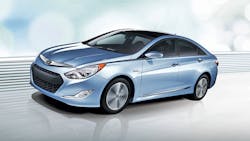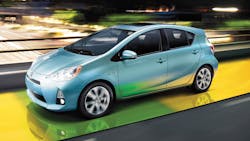Hybrids no longer represent a green niche in the automotive market. Most major manufacturers are adding hybrids to their fleets to meet federal fuel efficiency guidelines as well as consumer demand. The New York International Auto Show, running from March 29 to April 7 at the Jacob Javits Center in the Big Apple, will turn the spotlight on several of these eco-friendly models.
Porsche Panamera S Hybrid
Porsche is known for its legendary sports cars. But don’t discount the performance of its Panamera sedan. The S Hybrid’s 3.0-liter V6 engine boasts 333 hp while the electric motor kicks in another 47 hp for a maximum of 380 hp in parallel full hybrid mode. It also has 428 lb-ft of torque at 1000 rpm, with a top track speed of 167 mph and 0- to 60-mph acceleration of 5.7 seconds (Fig. 1).
1. Porsche’s Panamera S Hybrid roars with 380 hp and 0- to 60-mph acceleration of 5.7 seconds while getting 33 mpg, all for $96,150.
The hybrid drive offers several driving modes. Its all-electric mode targets emissions-free driving in residential areas with speeds up to 52 mph. In its “E-Boost” mode, the electric motor assists the combustion engine. In coasting mode, the car runs with the combustion engine switched off. Its high-voltage nickel-metal-hydride (NiMH) battery is located below the floor of the trunk.
The electronic engine management system regulates the interplay between the combustion engine, electric motor, and battery. The eight-speed Tiptronic S gearbox uses a wide spread of gears for better fuel savings and improved comfort. Its direct fuel injection is optimized for torque, power output, fuel consumption, and emissions. The Panamera S gets 33 mpg. Pricing starts at $96,150.
GMC Yukon Hybrid
Hybrids are making their mark in the SUV market with fuel efficiency that rivals some combustion-engine sedans. The full-size GMC Yukon Hybrid taps two key strategies for fuel efficiency. First, its 6.0-liter Vortec V8 engine uses active fuel management to deactivate four of its eight cylinders at cruising speed. Second, its two-mode hybrid propulsion system adjusts to different driving conditions.
2. The full-size GMC Yukon Hybrid uses a 300-V battery pack to accelerate up to 25 mph and active fuel management to get 20 mpg city/23 mpg highway.
The Yukon’s 300-V battery pack can propel the SUV up to 25 mph on electric power alone. Regenerative braking provides extra power to recharge the battery pack. The Yukon hybrid puts out 332 hp at 5100 rpm with 367 lb-ft of torque at 4100 rpm. It gets 20 mpg city, which is 66% better than other full-size SUVs in its class, GMC says, and 23 mpg highway. The Yukon starts at $49,470.
Chevrolet Volt
Whether or not Chevrolet’s Volt is a hybrid is a matter of perspective. Its 16.5-kWh lithium-ion battery has a range of 38 gas-free miles, according to EPA estimates. After that, the 1.4-liter gas engine runs to keep the electric motor charged and going for a total of 380 miles on a full charge and a full tank of gas. When you’re done driving, use the standard 120-V charging unit to juice up the battery again in 10 to 16 hours or the 240-V unit to recharge in four hours.
3. The Chevrolet Volt gets 380 miles on a full battery and a full tank of gas. When you’re done driving, just plug it into a 120-V outlet for a fresh charge.
The Volt operates in four modes: normal mode for conventional operation, sport mode for more aggressive feedback and response, mountain mode for long, steep grades, and hold mode for keeping some battery charge in reserve. Regenerative braking adds to the Volt’s efficiency as well. And, the electric motor directs its 273-lb-ft torque right to the tires, with a top speed of 100 mph. The Volt starts at $31,645.
Hyundai Sonata Hybrid
Hybrid technology is emerging in mainstream vehicles as well. Powered by a 270-V, 35-kW lithium-polymer battery, Hyundai’s Sonata Hybrid uses a 47-kW permanent-magnet synchronous electric motor that propels the car from a standing start and operates in EV mode up to 74 mph. The 2.4-liter, four-cylinder combustion engine kicks in when the car needs to accelerate or climb an incline, or when the battery is running low.
4. The Hyundai Sonata Hybrid’s 270-V lithium-polymer battery and 47-kW electric motor propel the car from a standing start and gets 40 mpg.
An active airflap behind the front grill adapts to vehicle speed and coolant system temperature to reduce wind resistance and maximize highway fuel economy. The Sonata Hybrid also offers 199 hp combined at 5500 rpm with 154 lb-ft of torque at 4500 rpm. A lifetime warranty on the hybrid battery is offered as a standard part of the package. With an EPA estimated 40 mpg highway, pricing starts at $25,650.
Toyota Prius C
Toyota’s Prius was a breakthrough in the hybrid market. Since its initial success, Toyota has refined the technology and branched out with different models. Designed for young consumers in the urban market, the compact Prius C runs purely on battery power in EV Mode, while ECO Mode maximizes fuel economy by limiting climate control and adjusting the throttle response.
5. Designed for the young urban market, the $19,080 Toyota Prius C gets an estimated 53/46 mpg.
The Prius C relies on a 1.5-liter gas engine and a 520-V permanent-magnet ac synchronous electric motor, producing 60 hp and 125 lb-ft of torque. The 144-V sealed NiMH battery adds another 25.9 hp (19.3 kW) for net hybrid system power of 99 hp (74 kW). The C also preserves the Prius line’s aerodynamic styling, with 0.28 drag coefficiency. Overall, the C boasts an estimated 53/46 mpg and a $19,080 starting price.





